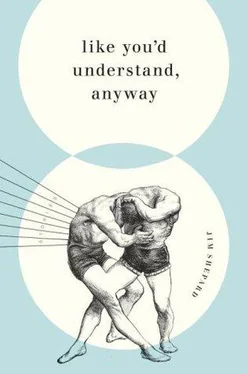So on the 22nd of March in the year 1792, the Abbé Chappe bestowed his invention, the telegraph, upon the Assembly. And on the 25th, Dr. Guillotin and Dr. Louis's machine was inaugurated. The culprit was strapped facedown to the plank, which was then tilted to the horizontal and run forward on grooves until his neck slid onto the lunette, a semicircular block. The block was not struck by the falling blade but grazed at high speed, so that the head was planed off. In an eye-blink it leapt seventeen or eighteen inches from the trunk. For some the head was gone before the eye could trace the blow. It became clear that the minimum size for the basket must be that of an infant's bathtub. The executioner's role in the proceedings consisted of giving a little tug on a lever. The crowd saw the blade but not the hand that moved it. Much time was consumed afterward with the mess. Four buckets of water alone were used on the grooves and block.
I used to have a constitution able to endure labor that might have hamstrung a team of oxen. Now my complaints include dizziness, inflammation of the eyes, colic, and rheumatic pains.
What talk I have with Anne-Marie occurs in the early morning before the workday begins. On the way out of our little courtyard I'll pass her hanging laundry to dry, if it's warm enough, or plucking salad herbs into a basket. Across from us a shop sells brushes of every manner and use. Its proprietor is a drunk and in all weather slumps beside its door in an old wreck of an iron chair. We can hear the knife grinder's bell as he makes his rounds.
For the last three months I've approached her heartbroken with the misfortune I helped author, because in August at the execution of three men accused of forging promissory notes, our youngest boy, Gabriel, fell when exhibiting one of the heads, fracturing his skull and dying before my eyes. He was twenty-one. There'd always been in our family puzzled concern about him, since he'd kept hidden his aspirations and inner life. All we knew was that he was great for peeling oranges when they were in season. In response to interrogatives he stroked his upper lip with his forefinger and seemed to wait for the intelligent part of the question to emerge. He'd wanted to try his hand at another profession, and Anne-Marie had wished the same for him. But I'd reminded her of his cousin's experience of having apprenticed himself to a locksmith only to find that no one would patronize their shop. The subject had been dropped. Then Gabriel had offered to join the National Guard, to which his older brother had responded by asking if he thought himself too refined for the family business. His uncles hadn't been even that kind. I had done my best to comfort him but had also requested that he remain a realist about his future.
That morning the clouds had poured forth rain, the sky churning as if with empyrean seas. The wood up on the scaffold was slick and the cobblestones below greasy with mud. Our hair was whipped by the wind. There'd been the usual silence as the executioner had walked about the platform, while each assistant tended to a special task, one assistant handling the strapping to the plank, one seeing to the remaining condemned, one adjusting the heads on the lunette while wearing a waxed ankle-length apron. Each assistant is given a chance at one point or another to display one of the heads.
Gabriel I usually assigned to the remaining condemned. He moved about his responsibilities like a child resignedly attending a new school. The third head pitched from its lost shoulders. It was his turn to reach his arm down into the basket. I could not see from where I stood whether his expression as he held it up by the hair was one of fascinated horror or queasy forbearance or distracted indifference. The rain and the three men's blood made the front of the scaffold slick as soap. There was no rail.
Perseus hoisted Medusa's head. Judith, Holofernes's. David, Goliath's. The head warns of the consequences of violating the sovereign peace. Held by the hair and presented at the scaffold, it represents the government's discharge of its promise to maintain order. An executioner's reputation depends to a large extent upon his efficiency and elan with that display. Doing his best to manifest the head to as much of the crowd as he could, and failing to look where he put his feet, our Gabriel slipped and split his head open on the cobblestones. The head he'd been holding scattered the crowd. We carried him back to the house in the cart that had brought the condemned.
It's said that, losing his wife and crazed with grief, Robespierre's father abandoned his four children, the eldest being only seven, and traveled in turn through England and the German states, eventually dying in Munich. And so young Robespierre became at seven the implacable and unhappy figure he remains today. All through the early morning hours of that terrible night, Anne-Marie lay like one of the Furies on her bed and would not be consoled. I was not allowed into the room.
A week passed before she addressed me. Her misery was a well from which her spirit refused to surface. I saw only stiffness and mistrust when I got too near. All her gestures seemed devitalized, as if viewed in dim candlelight. If not for her capacity for work, she would have seemed imprisoned in a perpetual exhaustion.
It was a busy time for the executioner. She observed without comment my unimpaired predilection for order, my consistency of demeanor, and my undiminished capacities of concentration.
We both remembered a time, after the imprisonment of the King, when I'd been of a sudden possessed by an ungovernable rage with all of those in power who had brought our nation to her present catastrophe, and had resolved to leave Paris. Gabriel in particular had loved the idea. But my passion had subsided, and I'd understood just a bit of what such a decision would involve. Was everyone to abandon his post every time the country took a turn for the worse? Was it left to each servant of the state to decide which laws he would carry out, and which he would not? Did anyone but the highest ministers have sufficient information on which to base their opinions?
Yesterday there was a hard frost and we woke to discover the waste plug had burst and covered the corridor in filth. Some of it had already frozen, and we scraped and chipped at it in the early morning darkness. The smell from what hadn't frozen drove us back. It was unclear to me, working beside my wife, which in me was stronger: hatred of my profession or hatred of myself. I asked her opinion and she didn't answer until later when making her toilet, when she remarked that she found my self-contempt understandable, given the minuteness of my self-examinations.
Even with my family, she told me as she served my supper before leaving the room, I craved the advantage of invisibility. My supper turned out to be beef and cabbage and runner beans.
I eat alone. I sit alone. Without her I have no intimate friend. No affectionate relations. For three months she's remained close-buttoned and oblique, her expressions lawyers' expressions. Some nights I sleep, when Heaven has pity on me.
The night before the waste plug, she woke to my weeping. She remained on her back and addressed the ceiling. She told it she'd overheard a boy on the rue de Rennes tell his wet-nurse that he'd gone to see a guillotining, and oh, how the poor executioner had suffered. Her tone prevented any response.
She knows that the exclusion of our profession from society is not founded on prejudice alone. The law requires executions, but compels no one to become an executioner.
So now I carry an emptiness with me like the grief of a homesick child. I understood my wife's misery and, under the compulsion of duty, added to it. Each night I take a little brandy, hot lemonade, and toast. My belly is in constant ferment. I'm a pioneer in a Great New Age in which I don't believe. My profession has grown over us like a malevolent wood.
Читать дальше












